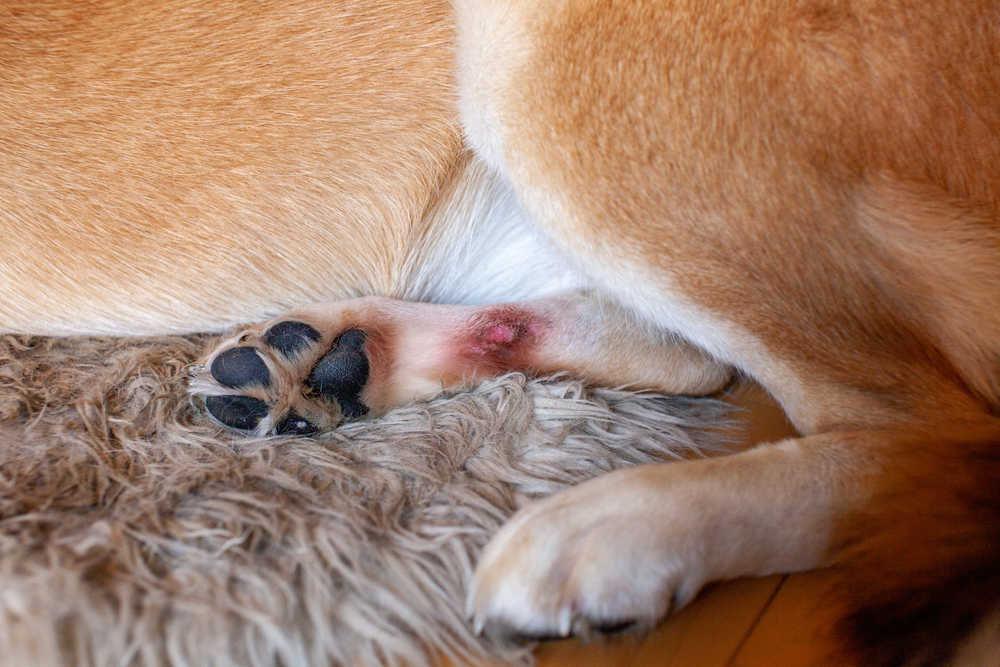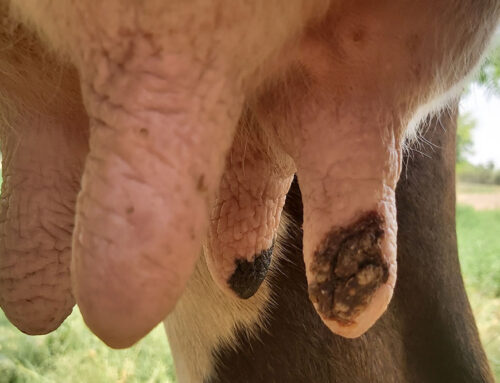When Scratching Becomes a Sign: Managing Skin Allergies in Dogs
At what point does simple scratching become serious? Itchy, inflamed skin often points to underlying allergies. Environmental or food sensitivities trigger most cases, and without proper care, infections can follow. Through targeted testing, tailored treatment, and ongoing management, we help restore comfort and prevent flare-ups so your pet can get back to feeling their best.
At The Vale Veterinary Group, our compassionate team provides advanced, personalized care across our four centres in Cullompton, Tiverton, Honiton, and Uffculme. With decades of experience serving Devon’s pets, each location combines local familiarity with modern diagnostics and 24-hour emergency support for registered clients.
What Causes Your Dog to Itch All Season Long
When pollen counts rise or humidity settles in, many dogs begin scratching relentlessly. This reaction stems from atopic dermatitis, an immune system overreaction to harmless environmental substances. Atopic dermatitis causes inflammation that makes skin unbearably itchy, even when exposure to allergens seems minimal.
Just like in humans, common environmental triggers include tree and grass pollen, mold spores, dust mites, and even certain plants. Regional climate plays a significant role. Warm, damp conditions extend allergy season and create ideal environments for mold and dust mites to thrive. Dogs living in humid areas often experience longer periods of discomfort than those in drier climates.
Genetics also influence susceptibility. Retrievers, Terriers, Bulldogs, and other breeds show higher rates of allergic skin disease. These predispositions mean some dogs will struggle with allergies regardless of where they live or how clean their environment stays.
Indoor pets are not immune. Allergens drift inside through open windows, cling to clothing, and settle into carpets and bedding. Even dogs who rarely venture outdoors can develop severe reactions to household dust or seasonal pollen brought in by their owners.
At The Vale Veterinary Group, our dermatology services help identify triggers and create management plans tailored to your dog’s specific needs. Regular routine healthcare visits allow us to track seasonal patterns and adjust treatments before symptoms escalate.
Why Ignoring the Itch Can Lead to Serious Problems
Allergies create ongoing inflammation that damages skin barriers and invites secondary infections. Without treatment, minor itching quickly spirals into painful, chronic conditions that affect your dog’s quality of life.
Skin and Coat Damage
Constant scratching and itchiness cause visible changes. Dogs develop red, inflamed patches, lose hair in affected areas, and may show bumps or flaky skin. Paw licking becomes obsessive, leading to stained fur and raw, irritated skin between the toes.
Hives can appear suddenly, creating raised welts across the body. When dogs chew their paws excessively, deep interdigital infections develop, causing swelling, pain, and difficulty walking.
Hot spots form when dogs lick or scratch one area repeatedly. These moist, infected lesions spread rapidly and require immediate veterinary attention to prevent deeper tissue damage.
Chronic Ear Infections
Allergies frequently trigger ear infections in dogs. The ear canal becomes inflamed, creating a warm, moist environment where bacteria and yeast thrive. Dogs shake their heads, scratch at their ears, and develop a distinctive odor.
Discharge may be yellow, brown, or black depending on the infection type. Touching the ear causes obvious discomfort. When infections recur frequently, underlying allergies are almost always the cause.
Severe or untreated ear infections can lead to ear hematomas, where blood vessels rupture inside the ear flap from repeated head shaking. These require surgical drainage and often result in permanent ear deformity.
Eye and Respiratory Complications
Red, watery eyes accompany many allergic reactions. Dogs rub their faces against furniture or carpet, attempting to relieve the irritation. Sneezing fits occur during high pollen days, and facial rubbing intensifies.
Repeated scratching near the eyes can cause corneal ulcers, painful scratches on the eye surface that require immediate treatment to prevent vision loss.
Brachycephalic breeds already struggle with breathing due to their facial structure. During allergy season, mild respiratory irritation compounds their existing difficulties, making exercise and heat tolerance even more challenging.
If you notice any of these symptoms, contact us for an examination. Early intervention prevents minor issues from becoming chronic problems.
Identifying the Root Cause Through Veterinary Testing
Accurate diagnosis requires detailed investigation. Allergies rarely exist in isolation. Environmental allergies often overlap with food sensitivities or parasite reactions, making it essential to rule out multiple causes.
Testing for Environmental and Contact Allergies
Diagnosis begins with a thorough medical history and environmental review. We examine when symptoms worsen, which seasons bring flare-ups, and whether certain locations trigger reactions.
Blood panels and intradermal skin testing identify specific environmental triggers such as grasses, weeds, tree pollen, and dust mites. These tests guide treatment decisions and help create targeted immunotherapy protocols.
Don’t fall into the trap of tests you can buy online- saliva tests lack reliability and often produce false results. Professional veterinary testing provides accurate information that leads to effective treatment plans. Keeping a symptom diary helps identify patterns related to weather, location, or seasonal changes.
Recognizing Flea Allergy Dermatitis
Flea allergy dermatitis represents one of the most severe allergic reactions in dogs. A single flea bite injects saliva into the skin, triggering intense itching that lasts for days.
Affected dogs develop scabs and hair loss along the tail base, rump, and inner thighs. Many dogs groom so aggressively that visible fleas disappear, making diagnosis challenging. Even without seeing fleas, the distribution pattern of skin lesions often confirms the diagnosis.
Conducting Food Elimination Trials
Elimination diet trials remain the only reliable method for diagnosing food allergies. The process requires feeding a novel protein source or hydrolyzed diet for eight to twelve weeks while avoiding all other foods, including treats and flavored medications.
After the trial period, we reintroduce the original diet. If symptoms return, food allergy is confirmed. Common food allergens include chicken, beef, dairy, and certain grains, though any protein can trigger reactions.
Food allergies typically cause year-round symptoms rather than seasonal patterns, helping distinguish them from environmental causes.
Effective Treatment Strategies for Long-Term Relief
While allergies cannot be cured, consistent management controls symptoms and prevents complications. Treatment focuses on three goals: reducing allergen exposure, calming inflammation, and supporting skin healing. When your pet isn’t feeling their best, we’re here to help.
Controlling Environmental Exposure
Simple daily habits significantly reduce allergen contact. Wipe your dog’s paws and belly with a damp cloth after outdoor activities. This removes pollen and other allergens before they spread throughout your home.
HEPA filters capture airborne particles and improve indoor air quality. Keep windows closed during high pollen days and wash your dog’s bedding weekly in hot water. For severe cases, protective booties or light body suits create physical barriers against outdoor allergens.
Topical Therapy for Immediate Relief
Topical treatments remove allergens from the skin surface while soothing inflammation. Medicated shampoos, mousses, and wipes provide direct relief to affected areas.
Proper bathing technique matters. Lather the shampoo and let it sit for ten minutes before rinsing. Focus on paws, belly, underarms, and other areas where allergens accumulate. Regular ear cleaning prevents infections in allergy-prone dogs.
Routine grooming removes loose fur, dander, and trapped pollen. Professional grooming services can be especially helpful during peak allergy seasons.
Prescription Medications and Advanced Therapies
Antihistamines provide mild relief for some dogs but rarely control moderate to severe allergies alone. Prescription medications offer more effective solutions.
Apoquel and Cytopoint target specific immune pathways that cause itching, providing fast relief without the side effects of traditional steroids. These medications work within hours to days and can be used long-term.
Immunotherapy retrains the immune system to tolerate allergens. Allergy shots or oral drops gradually desensitize your dog over months to years. While immunotherapy requires patience, it offers lasting results and reduces the need for other medications.
Laser therapy reduces inflammation and accelerates healing for hot spots or chronic skin damage. The treatment is painless and works well alongside other therapies.
Year-Round Parasite Prevention
Consistent flea prevention is essential for allergic dogs. Even a single flea bite can trigger weeks of discomfort. Modern preventatives kill fleas before they bite, breaking the cycle of allergic reactions.
Indoor dogs in warm climates need protection throughout the year. Fleas survive indoors and remain active during mild winters. Without prevention, other allergy treatments become far less effective.

Common Questions About Managing Dog Allergies
Can dogs outgrow their allergies?
No. Allergies are lifelong conditions, though symptoms may fluctuate in severity. Consistent management reduces flare-ups and maintains comfort.
Are allergies contagious between pets?
No. Allergies result from individual immune system responses. Each pet reacts differently to environmental triggers.
Can cats develop seasonal allergies too?
Yes. Cats show allergies through overgrooming, hair loss, and chronic ear infections rather than obvious scratching.
Is immunotherapy safe for long-term use?
Yes. Immunotherapy carries minimal risks and provides lasting relief by addressing the underlying immune response rather than just suppressing symptoms.
Can I give my dog human allergy medications?
Only under veterinary guidance. Some human medications are toxic to dogs, and proper dosing requires professional calculation based on weight and health status.
Creating Comfort Through Consistent Care
Allergies challenge both dogs and their owners, but accurate diagnosis and tailored treatment bring significant relief. Monitoring seasonal triggers, maintaining prevention routines, and adjusting therapies as needed keep symptoms manageable throughout your dog’s life.
At The Vale Veterinary Group, our experienced team provides comprehensive allergy management for pets of all species. Whether your pet needs diagnostic testing, prescription therapy, or ongoing support, we’re here to help. Prompt attention prevents minor discomfort from becoming chronic disease. Visit one of our four centres, or call us to schedule an allergy consultation today.






Leave A Comment